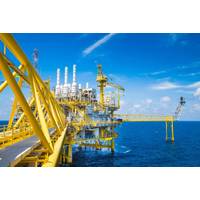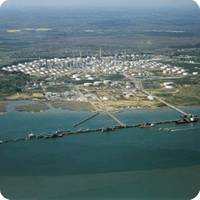Australia's Best Option is LNG Imports

Australia has painted itself into a corner with its natural gas industry and faces the stark reality that there are no easy choices to alleviate the dual problem of a looming supply crunch and the associated higher prices.Australia is far from the first country to find itself with an energy issue, but it is unusual insofar as the country is about to become the world's largest exporter of liquefied natural gas (LNG), and still it can't get its policy settings right to ensure domestic supplies.It sounds counter-intuitive and somewhat bizarre, that a country…
AGL Decision on LNG Import Terminal Expected in FY2019
AGL Energy Ltd, Australia's biggest power producer, expects to make a final investment decision on the country's first liquefied natural gas (LNG) import terminal in the financial year of 2019, a company official said on Friday.The A$250 million ($189 million) project will consist of a leased floating storage and regasification unit (FSRU) and jetty at Crib Point in the southeastern state of Victoria. The terminal will handle up to 130 to 140 petajoules a year, or 2.6 million tonnes of LNG, by 2020 or 2021."We are working to progress the project to a final investment decision in the financial year 2019 and are on track to do that…
EDF Unit Seeks to Triple Retail Base in Italy, Eyes ENI Portfolio
Italian energy group Edison , a unit of French utility EDF, wants to triple its Italian customer base and would be ready to buy Italian energy group Eni's retail base, said Edison chief executive Marc Benayoun. Benayoun told reporters on Monday that if it could make a deal with Eni, it would be ready to sell a 20-35 percent stake in its capital to a long-term Italian investor in order to finance that deal. Edison, which has about 1.2 million retail customers in Italy - half in power, half in gas - hopes to grow its customer base to 3-4 million as it aims to benefit from the opening of the Italian energy market in 2018. Benayoun also said Edison could return to profitability in 2018.
Tokyo Gas Sees It Losing Market Share Due to Liberalisation
Tokyo Gas Co expects its market share to fall by a double digit amount over the long term as it loses its monopoly on retail city gas sales in its service districts next year, the head of Japan's biggest city gas supplier said on Thursday. Next April, city gas suppliers will lose their monopoly on the retail city gas market, one year after the retail power market was opened to full competition on April 1. A major provider of natural gas to Tokyo and the surrounding regions, Tokyo Gas lat month projected a market share loss of about 10 percent by 2020/21, taking into account the liberalisation of the currently regulated city gas sector.
Poland Cuts PGNiG's Gas Tariffs for Firms by up to 5.1 pct
Poland's energy market regulator URE said on Friday it has decided to cut dominant gas distributor PGNiG's prices of high-methane gas for commercial end users by 5.1 percent and for wholesale customers by 4.7 percent. The regulator said it was acting in response to low prices on world energy markets. It has not yet decided what to do with tariffs for retail customers, though the head of the regulator has said these could also be lowered. URE also said it decided to cut tariffs for nitrogen-rich gas, which is of lower quality than high-methane gas, by 4.9 for commercial end users and 4.8 percent for wholesale customers. The decisions will come into effect as of August.
Australia's LNG Boom's Domestic Impact
It's somewhat ironic that as Australia ramps up to being the world's biggest exporter of liquefied natural gas (LNG), domestic industries are under threat from not being able to source the fuel. A combination of new LNG plants, exploration moratoriums and a successful anti-gas campaign means that industry and residential users in the three most populous states, New South Wales, Victoria and Queensland, may struggle for natural gas supplies within the next two years. The first of three coal seam gas to LNG plants in Queensland starting shipping cargoes in December last year, and the others are due to start producing later this year.
UniCredit CEO Sees No Writedowns Due to Russia
Italy's UniCredit , one of Europe's banks with the greatest exposure to Russia, said on Tuesday it would not book any writedowns in the fourth quarter of 2014 or in 2015 because of the financial and economic crisis in the country. UniCredit CEO Federico Ghizzoni said its Russian unit had strong fundamentals, ample liquidity while the quality of its loan portfolio was very good. The bank was a net lender to the group for 1 billion euros, he said. "The 2014 results (of UniCredit in Russia) are in line with our expectations, if not slightly better," Ghizzoni told reporters.
Exxon Works to Reopen Siphoned UK Pipeline

Exxon Mobil is working to reopen one of Britain's main underground fuel pipelines after the discovery of a tapping device and a stash of diesel that police believe was siphoned off by thieves. The company, which operates as Esso in Britain, said on Tuesday that the device was found on the Midline pipeline that transports fuel from its Fawley Refinery near the south coast to its Birmingham fuel terminal in central England. "Our specialists are now working to remove the tapping device and repair and test the pipeline and restore it to normal operations as soon as possible," Exxon said in a statement.
Esso Shuts UK Fuel Pipeline after Theft Report

Exxon's UK arm Esso has shut a pipeline running from its Fawley oil refinery near Southampton for checks, the company said on Monday, after a report that thieves tapped into the line and took thousands of litres of fuel. "Esso is committed to the very highest standards of safety. The pipeline has therefore been closed down and our specialists are working to check it and, if necessary, effect any repair," the statement said. A company spokesman said Esso did not expect its retail customers to be affected by the pipeline closure. Esso is a UK unit of Exxon Mobil.
